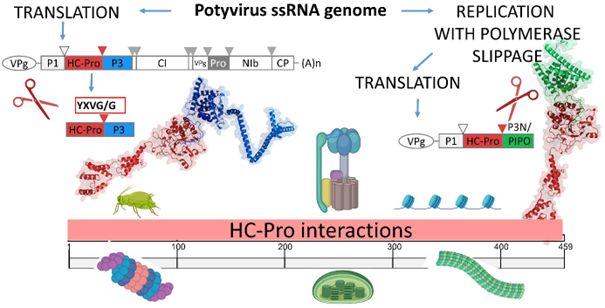While proteases of mammalian viruses are among the most studied enzymes, much less is known about plant virus proteases. In their recent article, the researchers from the Laboratory of Plant Biochemistry focused on the cysteine protease found in potyviruses, representatives of one of the largest genera of plant RNA viruses. The study was created in collaboration with colleagues from the Institute of Experimental Botany and the Institute of Microbiology of the Academy of Sciences of the Czech Republic.
Many viruses encode one or more proteases whose function may not be solely to cleave the viral polyprotein, but they are proving to be invaluable and versatile helpers for the virus in various steps of its life cycle. In animals, viral proteases may be involved in the cleavage of host proteins, both to suppress immune responses and to obtain fragments for use in the life cycle. For proteases of plant viruses, the action on host proteins is much less well understood, although about half of plant viruses encode a protease. In a review article in Plants, special issue New Horizons in Plant-Microbe interactions, members of the Laboratory of Plant Biochemistry in collaboration with the Laboratory of Virology, Institute of Experimental Botany of the Czech Academy of Sciences focused on the HC-Pro (Helper Component-Protease) protease of potyviruses, a member of the family Potyviridae, of which potato Y virus is a representative. This cysteine protease, in addition to autocatalytically cleaving itself from the potyviral polypeptide at the YXVG/G site, also enables horizontal transmission of viral particles by aphids and mediates suppression of the plant defense response against viral infection, is a suppressor of gene silencing, and thus increases the severity of infection symptoms, amplification and virus spread. Surprisingly, this cysteine protease is not supposed to have proteolytic effects on host plant proteins, although the authors found 146 potential proteins with the YXVG/G motif potentially cleaved by this protease within Viridiplantae in the UniProtKB database. On the other hand, an increasing number of HC-Pro interactions with host proteins have been identified. More than 20 of such interactions have been described to date. This way, HC-Pro is likely to help the virus to modulate the cellular environment to its benefit. But it seems that the plant does not remain passive, because some plant enzymes and proteins also interact with HC-Pro to the plant's advantage.

Reference: Hýsková, V.; Bělonožníková, K.; Chmelík, J.; Hoffmeisterová, H.; Čeřovská, N.; Moravec, T.; Ryšlavá, H. Potyviral Helper-Component Protease: Multifaced Functions and Interactions with Host Proteins. Plants 2024, 13, 1236. https://doi.org/10.3390/plants13091236





















